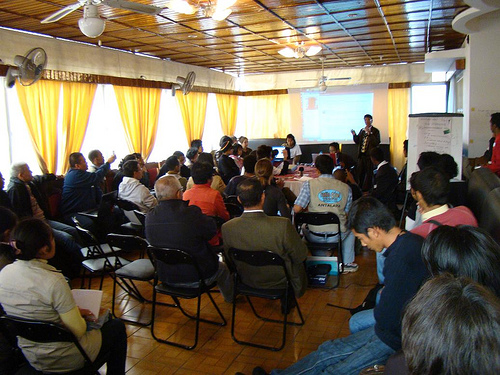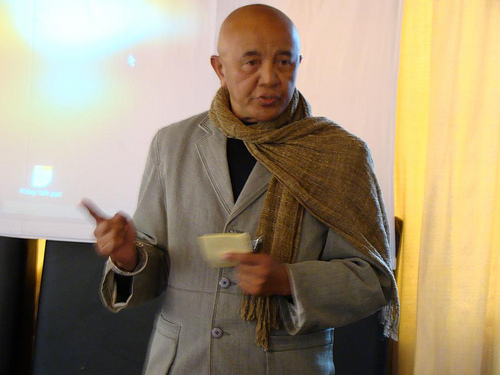As the political crisis in Madagascar drags along and international awareness of the situation fades, traditional media and new media in Madagascar came together to debate standards of collection and distribution of news in times of crisis.
The free exchange of ideas, power of personal testimonies, and the quality of interventions during the meeting produced an enriching conversation that highlighted the need for a collective effort to report complete, factual information despite unfavorable conditions.
This meeting built on the foundation posed by the organizers and the participants of the first Malagasy Barcamp in October 2008.
One of the most striking aspects of the meeting was the substantial attendance despite recent reports from Reporters without Borders and the Committee to Protect Journalists that many journalists and bloggers received threats to themselves and their relatives during the crisis. Participants took a stand for freedom of expression, knowing well that their names and faces were now public knowledge and that members of former and current administrations were present in the room.

Audience at information meeting via ariniaina
The discussion had to happen because such authentic, powerful and apolitical testimonies were too important to not be told publicly and on record.
Here is an overview of the time line of the event:
An estimated 80 to 90 people came from 5 different regions and 4 different countries.
Alain Andriamiadravola, former journalist and now new media enthusiast, opened a meeting that turned out to be a free-flowing conversation with plenty of dissident opinions and unexpected authorities in the field of information and journalism.
I gave a quick overview of collaboration between traditional media and new media worldwide, its tremendous impact during crises and our hope that such a collaboration can come to fruition in Madagascar. A smaller meeting that was part of the American Cultural Center-driven “Friday talk” between journalists and bloggers allowed for an open friendly criticism of both sides and showed that there are room for partnership and mutual growth.
The poignant part of the meeting came when citizens from all over the country gave their account of how they used personal media to share what they saw during the crisis and how it cost them. Andry explained that his thirst for raw information drove him to be where trouble was brewing. Jentilisa explained that it was very odd that on black Monday (Jan 26th) people would announce that a building was burning even before it actually happened, hence suggesting that some events were probably planned and not just random acts of protests. Avylavitra told a story of how he feared for his life on March 28th when a soldier hold him at gun point and demanded his camera. Jaona from Fianaratsoa explained how his blog was mentioned at a public meeting as a threat to social order in Fianarantsoa and should be shut down. Many other bloggers/twitterers shared similar stories of major hardships while covering the crisis.
Thierry Andriamirado explained the increased relevance of online social networks in dispatching news about the crisis. Thierry was the first to exhaustively live-tweet the first tragic event of the crisis, “Black Monday,” and explained that he felt compelled to share the stories in real-time for a time-stamped digital record of the events.
Former minister of culture and communication Tsilavina Ralaindimby emphasized that such testimonies and citizens’ willingness to report troubles are civic acts and must be protected at an institutional level.
Barijaona Ramaholimiaso argued that his personal ethic as a blogger demanded that he reveal his true identity and pointed out that there is another form of pressure in Madagascar, the social peer pressure that prevents people from freely expressing their minds.
Christie Turner and Affick Gassard presented an initiative to promote the development of community radio in Madagascar. Some remote rural areas were aware of the development of the crisis thanks to a radio center that received online news feed through dial-up connection and broadcast the information to rural communities.
Claire Ulrich gave a complete report on censorship online in the world building on examples from Iran and China, emphasized the importance of protecting first and foremost the well-being of journalists and bloggers. She also warned the audience to be mindful of the fine prints in the upcoming bill on the regulation of online communication in Madagascar. She also pointed out that both communities, traditional and new media, ought to come together to ensure that the memory of journalists killed during the crisis, like Ando and others, is never forgotten.
Finally, Harinjaka, Arinaina and Tahina presented the Foko Ushahidi platform, explaining how it came about and how SMS reports to a local phone number can be utilized for crisis reporting, but also other urgent humanitarian news and election monitoring.
Journalists also weighed in. Randy Donny, journalist and advocate of citizen journalism argued that there are no difference between journalism and citizen journalism in Madagascar. If anything he said, citizen journalist covered the crisis better because they were not under direct pressure from whichever regime ruled at the time.
The consensus at the end of the meeting was that the flow of information was/is severely affected bythe crisis. The information community came to a common agreement that we all needed to make a conscious effort to fight censorship and provide news free of government pressure. It was also an opportunity for people who followed the crisis through blogs to meet in real life the people behind the coverage. For instance, Jacqueline, in the audience, was still beaming from chatting with blogger Jentilisa. She said
:” I read his blog everyday since January. It is just awesome to put a face and a personality on such remarkable people. “
Stay tuned for more on the current state of media in Madagascar.
Here are additional reports from the meeting:
Ariniana:
Tahina:
Avylavitra
Harinjaka:
sixthman:
photos
Madagascar matin ( print only version)








8 comments
Great report Lova :)
Thanks for the report, best wishes for Madagascar.
Important things to know, thanks guys!
Hello,
I am so disappointed not to see any article about Madagascar since july.
Please share your comments.
Blessings for the new year 2010.
Rabary
Hello Rabary,
We will try our best to publish reports more regularly. Thank you for reading and appreciating the articles.
If you know of anyone willing to contribute, do not hesitate to contact us. Best wishes for the the New Year.